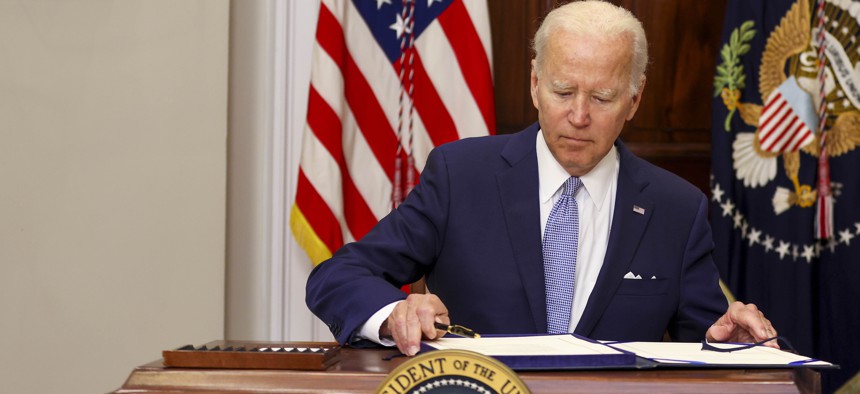$750M Headed to States For New Gun Control Initiatives

U.S. President Joe Biden signs the Bipartisan Safer Communities Act into law in the Roosevelt Room of the White House on June 25, 2022 in Washington, DC. The legislation is the first new gun regulations passed by Congress in more than 30 years. Tasos Katopodis/Getty Images
But legal experts say a key part for states—red flag laws—could be in jeopardy after the conservative Supreme Court struck down New York’s gun law last week.
Editor's Note: This story was updated when President Biden signed the gun control bill into law Saturday morning.
President Biden on Saturday signed into law what supporters call the most significant piece of gun legislation since the 1994 assault weapons ban. Congress’ bill includes $750 million that will be heading to the states to fund red flag laws and other gun control initiatives.
But as a result of a compromise to win over enough Republicans to pass the measure in the Senate, states will not have to pass laws opposed by gun rights groups and some Republicans. Rather, states will be able to use the funds on strategies to try to intervene when gun owners are deemed to be a danger to themselves or others, such as mental health courts where people can be ordered to get treatment.
“For the first time in decades, we’re sending legislation to the president’s desk that will make progress in ending the scourge of gun violence,” said Rep. Jerrold Nadler, a New York Democrat, on the House floor, shortly before the measure passed on a 234 to 193 vote early Friday afternoon.
U. S. Conference of Mayors CEO and Executive Director Tom Cochran said in a statement released following the bill’s passage that “more must be done.” However, he called the bill historic.
“This is a momentous day for the country and for American mayors who have fought for stronger gun safety laws for decades. Too many of our people have died on our streets, in our schools, and at our places of worship,” he said.
A key part of the measure–encouraging red flag laws–could face both political and legal obstacles. The passage of the bill Democrats call a step forward in addressing gun violence came just a day after the U.S. Supreme Court set a high standard for states and localities to be able to regulate firearms.
The Supreme Court on Thursday threw out the New York gun law that required gun owners to show a special need to be allowed to carry concealed guns in public. California, Hawaii, Maryland, Massachusetts, New Jersey and Washington, D.C. have similar laws that were jeopardized by the ruling.
In the Supreme Court’s ruling in New York State Rifle & Pistol Association v. Bruen, however, Justice Clarence Thomas writing for the court’s majority said gun regulations need to reflect “American tradition” by complying with the thought at the time of the passage of the Constitution.
The ruling could endanger the future of red flag laws just as the Congress is throwing money to states to get more of them to enact the laws, gun law expert Adam Winkler, a University of California, Los Angeles professor, told Route Fifty. The ruling, Winkler said, “spells trouble for innovative gun laws that were not in effect in the 1770s,” including the red flag laws.
Rep. Chip Roy, a conservative Texas Republican, said red flag laws could be in trouble.
“I do think yesterday's decision certainly reminds us that the right to bear arms is something that the court has now repeatedly recognized as a fundamental right,” he said in an interview Friday. “This bill is encouraging red flag laws, which limit some people's ability to bear arms. So I think yesterday's decision will certainly raise questions about the bill the House is ironically passing the day after the ruling.”
Illustrating the legal uncertainties ahead, Joseph Blocher, co-director of the Duke Center for Firearms Law, said “there’s a long tradition” in the nation of disarming people thought to be dangerous, which gives hope for red flag laws, also known as Extreme Risk Protection Orders.
“I think that ERPOs fit comfortably within that tradition,” Blocher said in an email Saturday.
Despite receiving bipartisan support in both the House and Senate, multiple House Republicans on Friday attacked red flag laws, saying they violate Second Amendment rights by allowing courts to take guns from people at least temporarily without a hearing. The laws also could be a target for gun rights groups.
“Today, they're going after the Second Amendment rights of Americans,” said Rep. Jim Jordan from Ohio, a member of the House’s conservative Freedom Caucus, on the House floor.
Indeed, Senate Democrats, during negotiations, faced opposition from Republicans to the idea of only providing funding to states willing to pass red flag laws. As a compromise, Democrats allowed the money to be used for other purposes.
Legal experts, though, said allowing states to use the federal dollars for other purposes weakens the incentives for states to enact red flag laws.
In addition to the funding, the gun measure also expands background checks for people ages 18 to 21, adds dating partners to laws prohibiting those convicted of domestic violence from acquiring guns, and sends $250 million in funding to states for community-based mental health services.
Democrats on Friday acknowledged the bill falls short of the broader changes they wanted including expanding background checks for all gun purchasers. However, they said it was the furthest they could go while getting the bipartisan support to pass a bill.
“Some action is better than no action,” said House Majority Leader Steny Hoyer, a Maryland Democrat.
“This is a step forward. That’s how we make progress in this country, a step at a time,” he said on the House floor.
Kery Murakami is a senior reporter for Route Fifty.
NEXT STORY: The Next Chapter for Battles Over Abortion in the States






